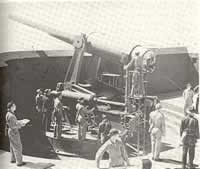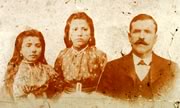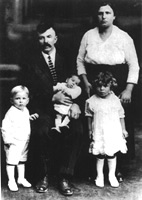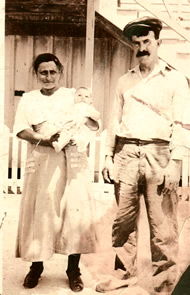Della's Recollections
Page 4
People talked about German submarines being out in the Gulf and some ships had been torpedoed off the Texas-Louisiana coast. There were articles in the newspapers. I didn't think too much about it until Danny went to sea. Mostly what impressed me was what I saw in the newsreels at the movies. Galveston seemed very far from the war to me.
There had been soldiers at Fort Crockett for as long as I can remember. Even before the war they used to have artillery practice. We didn't live very far from the fort and could hear when they fired their big guns. They had big concrete emplacements covered with dirt and grass with great canons on railway tracks. After the war began they shot those big canons more than usual. They also had planes towing targets out over the Gulf that they used for target practice daily. I was working during the day and so most of the time I didn't hear it or pay any attention to it unless they were using their biggest guns.
There had been forts at the entrance of Galveston Bay for a long time. Old Ft. San Jacinto at the east end of the island and Fort Travis on the other side at the Bolivar Peninsula had been used during the Civil War and Spanish American War. These fortifications were reactivated during World War I and then again just before World War II. After Pearl Harbor they did lots of construction to improve Ft. Crockett. I think that the Coast Guard or Navy took over those that guarded the Bolivar Rhodes at the entrance the ship channel into Galveston and Houston. There was an Army Air Corps base at Ellington Field in Houston and somewhere up on the mainland they had a Navy Blimp base. Regular air patrols were mounted over the Gulf of Mexico. There were lots of Coast Guard and Navy ships in the port of Galveston all of the time. Even though Galveston had long been an Army garrison I saw a lot more uniforms than before the war.
I was young and didn't pay so much attention to the war. They would always have newsreels before the movie features and I was always eager for them to finish the news and get to the feature. The older people took it much more seriously. Louie Bunde became an Civil Defense warden and had a uniform and went around checking that people adhered to the dim out and black out regulations. Danny's uncles, George Smith and Louis Bunde, were in the Coast Guard Auxiliary. These were older men who wanted to help out and had uniforms and went out at night and patrolled the beaches or the bays and coastal waters in yachts and small boats looking for saboteurs.
I suppose the war became more real - really came to Galveston when the German prisoners arrived. It was while Danny was away at sea, maybe late 1943 or the beginning of 1944. They built a big compound in open fields that used to be between my mama's house and the beach. These fields were down 55th Street to the South across Stewart Road. They had very high electrified wire fences with raised guard towers. I don't remember Germans in their uniforms. It seems to me that they were dressed like prisoners. We used to walk by the fence on our way to the beach and see them on the other side. Me and my friends would be in our shorts or bathing suits and the German boys would all come to the fence to watch us. The MP's did too. The ones in the guard towers would look down. Some times they'd try to talk to us but we didn't understand German. We understood what the MP's said. We'd giggle and just keep on walking. Some of the Germans were very good looking. They were very young like our boys in the military. ( The first group of 165 Germans arrived at the Ft. Crockett compound on November 15, 1943. Earlier 500 POWs had arrived at Camp Wallace at nearby Texas City. The POWs wore denim uniforms with a large white "P" on the back. )
I was very surprised one time when I went with my mother to the Fort Crockett PX and found German prisoners working there. My mother as a military mom could shop at the PX because by that time both my brothers, John and Jaime, were in the Navy and my older sister Josephine was in the Army. The Germans were being used as butchers and they worked behind the counters. Some of them had been well trained in Germany and were very skilled butchers. Mama never bought any meat from a German but we were in there when I saw other women pointing to cuts they wanted and holding up fingers. The Germans didn't speak English and the customers would communicate with them in sign language. Coming face to face with the enemy literally brought the war home.
Danny’s uncle Tom Dycus was in the Merchant Marine. Tom Dycus had worked on Lykes Brothers ships before the war. He was a bosun and had a steady run. I believe that he regularly went to South America and up to Galveston, New Orleans and New York. During the war Danny’s uncle never went to Europe, though after the war he sailed all over the world. I know that submarines sank ships in the Caribbean and off South America but I never heard Tom Dycus talk about being attacked or seeing ships sunk, though he might have. I went to a dance at the Elks Hall with Tom Dycus and his wife, Danny’s Aunt Regina, before I had any children while Danny was away at sea. Later when we lived with Danny's parents, Regina and her two children live in the house behind us with Danny's grandmother. Regina's son, Tommy, was a few years younger than Danny and was too young to go off to war, though later he was in the Army in Korea during that war.
I don’t think Danny ever shipped with any black seaman, though he sailed with lots of Hispanics. The Merchant Marine, unlike the military services, wasn’t segregated. Tom Dycus sailed in integrated crews - I know that because Lykes Brothers had colored seamen on their ships even before the war, I believe. Tom Dycus was NMU ( National Maritime Union ) and Danny was SIU ( Seaman's International Union ) and so they never sailed together.
My father had been a seaman before I was born. He had worked on sailing ships when he was a boy. He was still a teenager when he got out of the Spanish Navy in 1901. He sailed in the Caribbean and Gulf of Mexico on English ships. He learned to speak English with a British accent. He was living in Cuba and sailing out of there. Eventually he came to Galveston and bought some land and milk cows and by 1912 was a U.S. citizen. My father who had been living in Galveston was almost 40 years old when he went back to Spain to visit his mother. He was the oldest of her several children. He met my mother, who was 18 years younger, during the visit and married her in 1920 in the village church on the mountain side. He never went back to sea but our home as I was growing up was often filled with seaman when a Spanish ship was in town. Later after prohibition my father had a bar down near the docks and Spanish and Latin American seamen hung out there. I remember he had some good friends that were Cuban seamen. There were always sugar and banana boats coming to Galveston and as I was growing up there were always merchant seamen around our home.
My father died in 1937 when just 55 years old, probably from a recurrence of TB, as he had it when he was a child. He left my mother who was just 40 and couldn't speak English with seven kids. It was during the Great Depression and until the war began, my family had hard times. We were farm laborers around the Galveston-Houston area that had lots of truck farms back then. All of us but my sister Mary, who was just a toddler went with mom and worked in fields of cantaloupe, melons and cotton. The farmers had it so bad they paid us with produce. They didn't have any money. Once we worked all season for a farmer who paid us with a hog. Mama killed it and butchered it herself and we put it in our horse-drawn wagon and hauled it home.
For a couple of years after my father died, I and my younger brothers were garbage pickers. My older brother John would hitch our horse to our wagon and take me and Jaime, Raymond, and Henry over to the Galveston city-county dump and leave us. I was just in my teens and the boys were children. We picked through the garbage all day. At the end of the day a Mr. Soto came in his truck and paid us for any rags and metal we found. On a really good day we might make a dollar, but usually we made less. John would come for us in the wagon and load all the pieces of wood we found and piled up. Mom used the wood to cook with and to heat our house.
It was horrible work. There were piles of smoldering garbage -- hills to us, that were smelly and disgusting. There was everything in it -- lots of sharp things. It was easy to get hurt and I often got bruised and cut. And there were desperate grown-ups combing through the garbage who could be very aggressive, and we were just little kids. That was definitely the low point of the Depression for me.
Mama sold off our milk cows, except for one, and all of our property except our house. Of course land wasn't worth anything then. She took in sewing and washing and we stood in the relief lines for government surplus food. The white people got to the head of the line and even the Negro people were ahead of us, as they could speak English and some worked for the white people running the program. Spanish speakers were at the back of the line. But we survived. My oldest brother, John, went off to the Civilian Conservation Corp and my older sister, Josie, got a job. With the war everything got better. I graduated high school and got a job and some of my brothers and sisters went into the service. By then Mama only had the youngest, Mary and Henry at home.
Continue on to the next voyage in the story - click here




